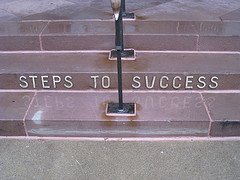“We are what we repeatedly do. Excellence, then, is not an act, but a habit.” ~Aristotle
Do you want to make meditation a habit that lasts? Do you know how long it takes for any new behavior to become a bona-fide habit? And technically, what does that even mean? My guess is that you’ve tried to meditate before. Maybe even a few times. But “life happens” and other things rise to the top of your priority list. Meditation gets bumped.
Life is like that. No question about it. And of course, meditation was first developed almost 3,000 years ago when life was much simpler. Time moved more slowly then and there were less distractions. For better and worse, the experience of life in the 21st century is accelerating all the time, and we have more things competing for our attention than ever.
So how are you going to turn meditation into a sustainable habit? To get the extraordinary benefits that meditation and mindfulness have to offer, you need to practice consistently. To achieve new levels of clarity, relaxation, focus, and mindful presence, you need to find a way to make meditation a regular part of your routine.
And to create a genuine habit, you have to get to the point where it’s automatic and you no longer have to think about it. But how?
What’s The Skinny On Habits?
 In truth, the path to your meditation habit may be closer than you realize. And the simple tip I’m about to share is a game-changer. But first, let’s quickly review the previous tips we’ve shared with you on making meditation a habit.
In truth, the path to your meditation habit may be closer than you realize. And the simple tip I’m about to share is a game-changer. But first, let’s quickly review the previous tips we’ve shared with you on making meditation a habit.
In our first article in this series on habits, we looked at the importance of 5 key factors: 1) Intention; 2) Commitment 3) Accountability 4) Support 5) Tracking Progress.
In our second article, we explored how to manage your natural resistance to change and why that’s essential to your success over the long haul. And make no mistake, science shows the odds are stacked against you and me. According to the research, we have about an 8% chance of forging our new self-improvement resolutions into genuine habits.
To be honest, those statistics are why we’re doing this series on habits. I want to share a few key leverage points that can make ALL the difference and help you overcome the odds. Today, we look at a third and powerful component of habit-building success.
How Long Does It Take To Create a New Habit?
 One of the keys to success in any new endeavor or habit is desire. You have to really want the change that results from your new behavior. But that’s not enough. You have to want it more than anything else…at least temporarily. In short, it has to be your top priority.
One of the keys to success in any new endeavor or habit is desire. You have to really want the change that results from your new behavior. But that’s not enough. You have to want it more than anything else…at least temporarily. In short, it has to be your top priority.
Why does it have to be your top priority? I’ll explain. But first, here’s a little research to set the stage.
A study from University College London (UCL) in 2009 tracked 96 people who were trying to establish a new habit. According to the study results, it turns out that 66 days was the magic number. That was the average time it took to turn a new behavior into a bona-fide habit.
That means you and I need to invest about two months of solid effort before our new behavior transforms into something we no longer have to think about—a habit. Because, after 66 days, you’ve trained your brain enough that the behavior becomes automatic.
 And according to that same study from UCL, “automaticity” is the key to habit formation. It’s the philosopher’s stone of habit-making that marks the alchemical shift from deliberate daily effort to effortless routine.
And according to that same study from UCL, “automaticity” is the key to habit formation. It’s the philosopher’s stone of habit-making that marks the alchemical shift from deliberate daily effort to effortless routine.
That’s what you’re shooting for with your new meditation practice. To make it an automatic habit, thereby minimizing your input of effort and self-discipline.
Making Meditation Your Top Priority For 66 Days
 Given the time and effort required for habits to form, it’s important that you privilege and prioritize your new behavior. For 66 days, It’s got to be more important than all the other good ideas competing for your attention until “automaticity” sets in.
Given the time and effort required for habits to form, it’s important that you privilege and prioritize your new behavior. For 66 days, It’s got to be more important than all the other good ideas competing for your attention until “automaticity” sets in.
So how do you prioritize meditation? Because that’s the number one thing you need to do to turn meditation into a habit.
First, get really clear on why you want to meditate. For example, do you want to overcome anxiety? Relieve stress? Do you want to find access to that perfect silence and stillness inside of you? Maybe you long to experience the limitless part of yourself? Maybe it’s simple and you just want to enhance your ability to concentrate and focus.
 Second, you need to start visualizing your success. Stop reading and imagine for a minute. What does it look like when you achieve the results from meditation that you’re looking for? How does it feel? Allow yourself to imagine it.
Second, you need to start visualizing your success. Stop reading and imagine for a minute. What does it look like when you achieve the results from meditation that you’re looking for? How does it feel? Allow yourself to imagine it.
Now that you’ve done that, you need to let that outcome that you just visualized become your top priority. You need to trust the deeper part of you that keeps compelling you to meditate. There’s a better, wiser you on the other side of that transformation.
The key to you making this a sustainable habit is staying connected to your vision of transformation and making that a priority. For a set period of time—66 days to be precise–you need to make meditation the most important thing.
An Action Plan To Make Meditation A Habit
 So here’s a simple action plan. You need to track your progress and make it visible. Start a meditation challenge worksheet. If you are consistent and follow through, you will have made a huge move towards establishing your new habit.
So here’s a simple action plan. You need to track your progress and make it visible. Start a meditation challenge worksheet. If you are consistent and follow through, you will have made a huge move towards establishing your new habit.
And here’s the thing, if you don’t take action, it’s definitely not going to happen. Consistent action is the only way to train your brain and create the neural pathways that will help you establish your meditation habit. And you need to act enough times to pave that pathway in your brain so that the action becomes automatic.
There will never be a better moment than now to start your meditation habit. Are you ready?
What’s the excuse that just popped up in your head? The truth is, you’re always going to have a variation of that nay-sayer in your noggin. We all have that same voice and it’s a broken record. Instead, don’t think about it. Just act.
There’s one last finding from that study out of UCL you should know about.
According to the research missing a day or two in your 66-day habit-forming sprint won’t diminish your chances of success. So don’t get down on yourself if you miss a day here and there. However, the study did show that for the habit to form it’s most important to be consistent in the beginning. Consistency at the outset is critical to your success.
In his legendary treatise on Habit, the famous psychologist William James said it this way:
“The acquisition of a new habit, or the leaving off of an old one, we must take care to launch ourselves with as strong and decided an initiative as possible. Accumulate all the possible circumstances which shall reenforce the right motives; put yourself assiduously in conditions that encourage the new way; make engagements incompatible with the old; take a public pledge, if the case allows; in short, envelop your resolution with every aid you know. This will give your new beginning such a momentum that the temptation to break down will not occur as soon as it otherwise might; and every day during which a breakdown is postponed adds to the chances of its not occurring at all.”



Nice article. I will meditate one hour daily from today and will continue it for 66 days unless it becomes my habit. Thanks
Thanks Gajendra, Thanks for your feedback. That’s definitely the spirit :-)! Really happy this information motivated to move on this so quickly. Keep us posted!